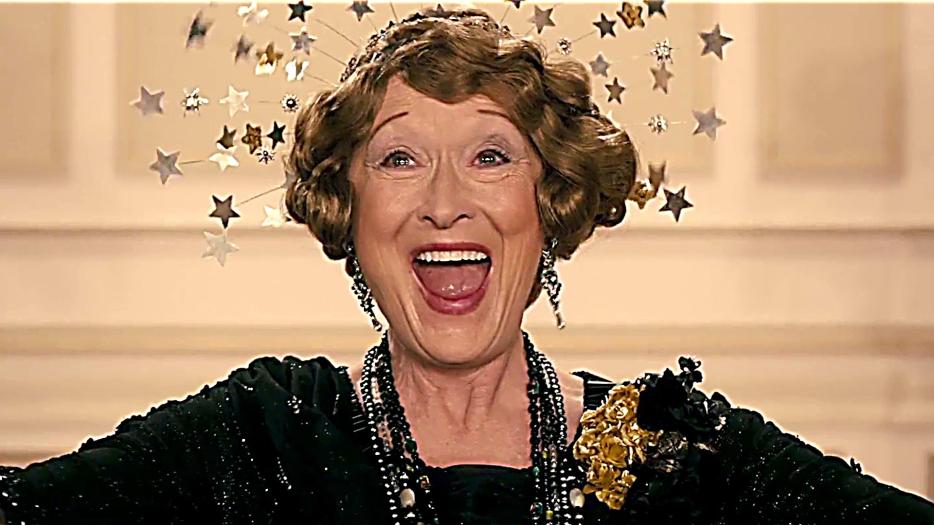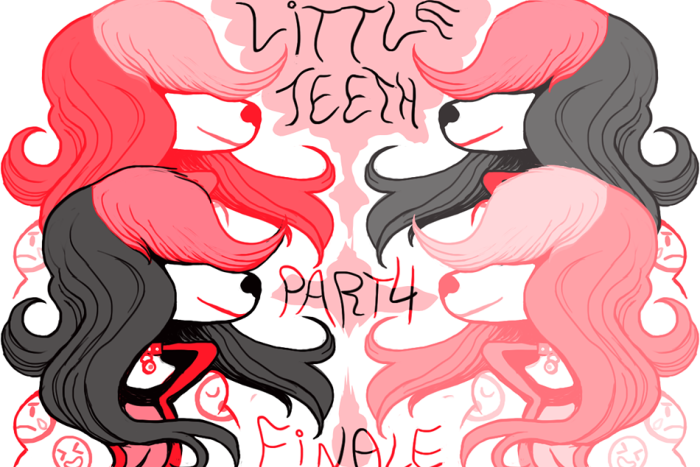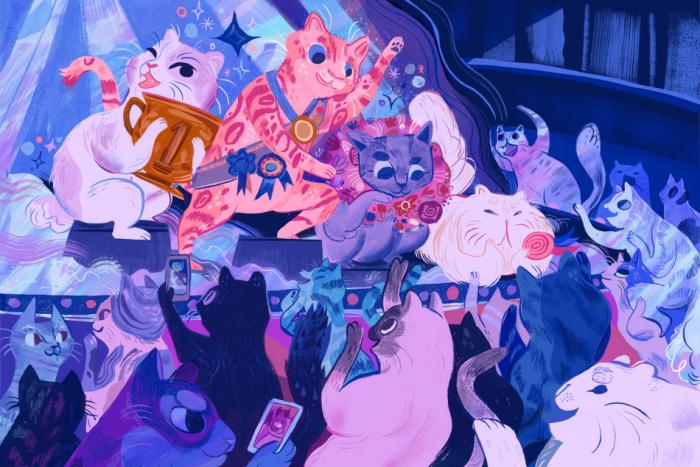For fidelity to mediocrity, no one beats Florence Foster Jenkins. The subject of a Stephen Frears-directed biopic starring Meryl Streep and Hugh Grant coming out in North America in August, Jenkins was a truly bad singer.11So much so that I also wrote about her in my book Bad Singer. But every year she held a recital at New York’s Ritz-Carlton Hotel and then, at age 76, she made it big: she played Carnegie Hall. “She was exceedingly happy in her work,” wrote Robert Bager in a New York World-Telegram review of the sold-out show in 1944. “It is a pity so few artists are. And her happiness was communicated as if by magic to her listeners . . . who were stimulated to the point of audible cheering, even joyous laughter and ecstasy by the inimitable singing.”
What Jenkins lacked in pitch, rhythm and vocal range, she made up for in attitude: “People may say I can’t sing,” she said, “but no one can ever say I didn’t sing.”
Nadine Cooper can now say the same thing. And most bad singers can probably relate to her story more than to Jenkins’s triumphant career. When Cooper was 11 or 12, a teacher told her to stop singing because she was spoiling it for everyone else. So she stopped. As an adult, she tried to avoid worrying about her inability to sing, but sometimes she’d think, “I wish I could do that.” Occasionally, she’d go as far as “I should be able to do that,” which eventually evolved into “There should be somewhere for me to do that.”
But there wasn’t. No-audition choirs abound these days, and they are ideal for many singers, even the untrained and the unconfident. But for truly bad singers, they are too intimidating. Cooper didn’t want to be in a situation where she’d have to apologize every second note: “I’m pretty sure I’d still spoil if for everyone else.”
Her lack of confidence is understandable. What remains unfathomable is that people actually tell children not to sing. And I’ve heard countless tales of people told to just “mouth the words.” Many teachers and musical directors have no idea how to help bad singers, but need bodies to make their choirs seem successful so they make young people go through the humiliating charade of faking it. Maybe the deception is easier for parents to accept than not having their kids be part of the recital at all, but it is the most effective way to give someone a life-long fear of singing in public.
For most middle-class people, growing up is just another term for a narrowing of interests. As a kid, I was fortunate to try soccer, skiing, sailing, skeet shooting, football, baseball, basketball, cricket, canoeing, cycling, golf, tennis, horseback riding, hockey and many other activities. Some (basketball) I gave a hard pass to right away because I was short and slow; some (skiing) I loved but stopped doing for financial reasons; some (golf) just became too frustrating. Today, I play hockey, cycle and go on an annual canoe trip. (Much to my surprise, though, I’ve also taken up yoga, something I long said I would never do.)
Cutbacks at schools mean reductions in sports and arts programs while high costs—even sports such as hockey are now so expensive that many families can’t afford them—and limited parental time can mean the end to some pursuits. We also launch our own self-selection process. Most kids don’t need to be the best player on the team to enjoy soccer and parents encourage their offspring to keep playing because the benefits, including exercise and working with teammates, are considerable. But we soon drop the activities we don’t enjoy and go harder on the ones we do—and the correlation between what we enjoy and what we’re good at is strong.
Adults routinely ask kids who’ve just played a game, “Did you score?” So both adults and other kids send us the message that anything we’re good at is more fun and more worthwhile than anything we’re bad at. Being the last one picked for a team can sour us on a sport, but the streamlining of interests can also be brutal in non-athletic pursuits. Eventually our parents stop putting our masterpieces on the fridge.
One way or another, we learn early on that it’s not okay to be bad. And we often carry this “knowledge” into old age. So we’re always impressed when adults take up activities they’d never tried before or wished they’d never given up. If the theories are right about the benefits of aging brains learning new stuff, then we may be staving off dementia later in life (and if the theories are wrong, at least we learned some cool new stuff). Sometimes we turn out to have a talent for it; sometimes we don’t and that’s okay because it’s actually good for us to do things we’re bad at.
*
Wanting to sing, Cooper asked Bernie Bracha, a choir director in Nottingham, England, about starting a Tone Deaf Choir. Although Cooper considered herself tone deaf, Bracha, an educational consultant and former music teacher, said that was unlikely and balked at the idea of such a choir. While bad singing is common, congenital amusia, the scientific term for tone deafness, is not—perhaps as rare as 1.5 percent of the population. Cooper, who has a chemical engineering degree from Cambridge and worked as a management consultant and planning manager before becoming an entrepreneur, did an online test: she wasn’t tone deaf. So she went back to Bracha and suggested a Tuneless Choir instead. This time, the choir leader agreed to hold one workshop to see if there was enough interest.
Sixty people showed up. The media, including the BBC, soon followed. And now at least 120 people—they range in age (early twenties to late seventies) as well as socio-economic background; about one fifth are men—show up at each session, held every second Thursday. The singers arrive early to socialize and then at 8, Bracha leads them through some warm-up exercises followed by about five songs, a break for tea and nibbles and then another half hour of singing. They clap after every song—and laugh when one falls apart.
When you do what you're good at exclusively, avoiding what you are bad at, you live in an evaluative world, one that’s full of judgement.
Cooper sees a huge difference between joining a regular no-audition choir, in which the majority can sing, and being part of the Tuneless Choir. “There’s no pressure,” she insists, “just pleasure.” And before long, she was receiving franchising enquiries from other English communities. In May, a choir in Sutton Coldfield near Birmingham launched with 86 participants. Cooper now has three franchisees and expects to have ten by the end of the year, making the Tuneless Choir a full-time job.
While she can list the benefits of singing in a choir—including the release of endorphins, the social activity, the easing of anxiety and depression and the strengthening of the immune system—Cooper’s motivation is simpler. “I just enjoy it. It's fun because we have a laugh and don't take things seriously. It's fun because it's mischievous,” she told me during a Skype conversation. She sees it as a form of rebellion and a chance to stick it to everyone who told her not to sing. “I'm not going to let people stop me from doing this.”
*
The story of the Tuneless Choir set me to thinking about why we do only those things we’re good at and, more important, if that’s a good thing. I naively thought the answer would be straight-forward and emailed my friend Alex Russell this two-part question: “Why is it good for us to do things we suck at? And why is it bad for us to only do things we are good at?”
Russell is a clinical psychologist (and, full disclosure, I helped him write a book on parenting a few years ago). To my surprise, he replied that we’d need to discuss it over a beer. When we sat down in a pub around the corner from his office in Toronto, he told me he’d been thinking about my question all day and had even discussed it with colleagues in his practice because it is so central to their work. “It taps into everything we're doing,” he said. “It is The Question, maybe.”
One reason the answer isn’t so easy is that before the last century, no one would have thought to ask it. Just making it through the day was enough of a challenge. People didn’t have much, if any, leisure time. So my question becomes relevant only in a culture where so many of us have the privilege of leisure time, the freedom to choose what we do with our lives and the ensuing burden to create an identity that's unique to ourselves. (We see the extreme of this in the culture of social media and selfies, or what Russell calls the “curated self.”)
In Mindset: The New Psychology of Success, Stanford’s Carol Dweck argues that people either have a fixed mindset or a growth one. With the former, mistakes are bad news. They feel bad. When you're young, you want to get away from them.
Even when you're older, you increasingly focus on the things you’re good at and avoid things you’re bad at. With a growth mindset, you see mistakes as opportunities for learning. If the tech industry’s spin about the extraordinary value of failure has any basis in fact, a growth mindset will become increasingly crucial for success. But Russell sees more and more young people with fixed mindsets (and he puts a lot of the blame on over-praising parents). “We are fighting it all the time in mental health centres and clinics.”
When you do what you're good at exclusively, avoiding what you are bad at, you live in an evaluative world, one that’s full of judgement. You’re always concerned about the quality of your performance so you’re always self-conscious. The danger is this becomes an inauthentic world, one that you don't engage in for its own sake and one that's not a lot of fun.
But there is another way to live. You can love what you’re good at, but also be willing to do things you’re not good at. You can say, “I suck, but let's do it.” Then you're freed up from comparing and can engage in activities for their own sake—something that’s essential for flow. A fundamental concept in psychology, flow is the state of concentrated motivation essential for productivity and happiness. You’re in flow when you’re fully immersed, emotionally focused and creatively involved, in an activity that is intrinsically rewarding rather than being motivated by money or praise. You may be getting paid or stand to gain some other reward, but that’s less important than the intrinsic qualities—including mastery, satisfaction and interest—that keep you engaged. Flow is not dependent on an evaluative sense of good and bad. So if you are enjoying singing in a choir without worrying about spoiling it for anyone else, you’re likely in flow. “You can have a sense of mastery even when you suck,” said Russell. “Everything's relative.”
Over the course of the first pint, Russell had mostly talked about why it's bad not to do stuff you're no good at. But by the second, we were getting to the first half of my question: why it’s good to do what we’re not good at. For one thing, it’s humbling—and who among us wouldn’t benefit from a bit more humility? While many people see humility as a weakness, even equating it with humiliation—hi, Donald Trump—Russell believes it’s a virtue and worries that we are losing touch with the capacity to be humble.
Enjoying what we aren’t good at is also an opportunity to laugh at ourselves, which is healthy. The ability to laugh at yourself, something else that’s become rarer and rarer, means you're conquering your early megalomania and seeing yourself in a more balanced and realistic way: that you may not always be right, that you have your own failings, that you are human. Other people respond well to that. “As a public speaker,” Russell told me, “I've learned that the number one way to win over your audience right away is to tell a story that makes you look bad.”
Finally, he added the obvious, because sometimes it’s a good thing to state the obvious: laughing at yourself makes life more fun.
*
Many years ago, I took up photography and my favourite instructor liked to say, “Do what you like, then find people who like what you do.” At the time, I thought that was the flakiest, hippie-dippiest thing I’d ever heard. I wondered if he was just trying to encourage his more hopeless students or if he really believed it. But I’ve since realized how wrong I was to giggle at him. In fact, I’ve come to see his words as uncommonly perspicacious.
And wittingly or not, the truly bad singers of the Tuneless Choir have found the people who like what they do. A funny thing happens when they sing together: they fall in with other singers and tend to mimic the best ones. So when Bracha sets them on the right note within their range, they can collectively get somewhere near it. The combined sound is like the crowd singing at a rugby or football match, explains Cooper. “It’s powerful because we are filling the airwaves with different notes, as well as showing little restraint.”
Some choir members are better than others—and a few could now cope with a community choir—but they joined for the fun of it. Still, she knows some will, with a little practice and stealth training from Bracha, turn out to be decent singers and may become more ambitious, wanting to sing in parts and tackle more difficult pieces. But those people are welcome to move on to “proper choirs,” as Cooper calls them. She is determined to maintain the Tuneless Choir’s purity.
Such commitment to mediocrity—and the flow available in it—is impressive. And much to Cooper’s surprise, the choir is becoming a popular novelty act. A rendition of “Delilah” at a choir festival in May received a standing ovation. The choir also shared the bill with the likes of Bryan Ferry, Seal and Lucinda Williams at the Cornbury Music Festival in July. Beforehand, Cooper told me her approach would be participation rather than performance: “Sing great songs, enjoy ourselves, and hope that those listening will want to join in, if only to improve the overall sound.”






